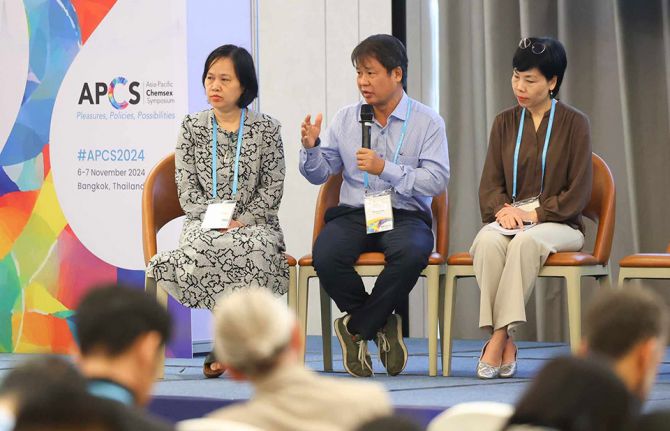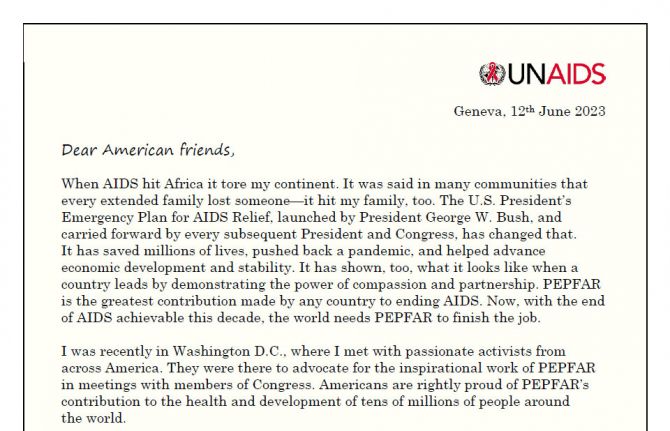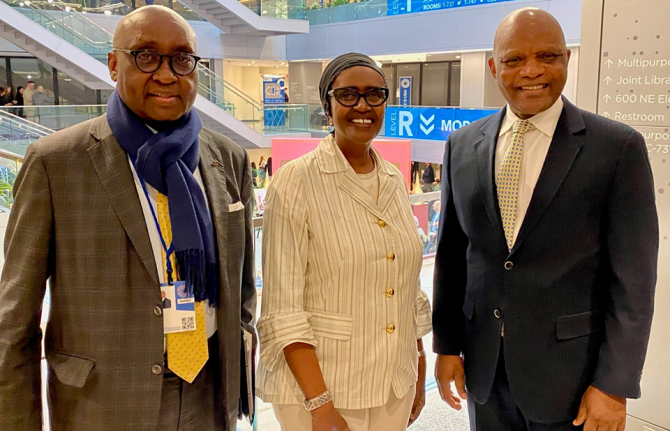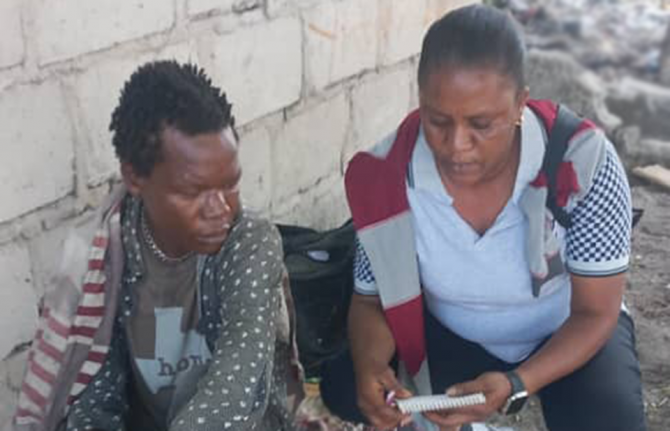
Feature Story
UNAIDS Forum on HIV, Human Rights and Men Who Have Sex with Men
17 September 2009
17 September 2009 17 September 2009 (L to R): Krista Lauer, AIDS Project Los Angeles, Dr Cheikh E. Traoré, Sexual Diversity, UNDP Senior Advisor, Tudor Kovacs, Population Services International, Romania, Ambassador Eric Goosby, U.S. Global AIDS Coordinator and UNAIDS Executive Director Michel Sidibé.
(L to R): Krista Lauer, AIDS Project Los Angeles, Dr Cheikh E. Traoré, Sexual Diversity, UNDP Senior Advisor, Tudor Kovacs, Population Services International, Romania, Ambassador Eric Goosby, U.S. Global AIDS Coordinator and UNAIDS Executive Director Michel Sidibé. Photo credit: UNAIDS/Jati Lindsay
As part of his official visit to Washington, D.C., UNAIDS Executive Director Michel Sidibé participated in the Forum on HIV, Human Rights and Men Who Have Sex with Men on 16 September 2009. The event was organized by UNAIDS in collaboration with the HIV Policy Working Group on Men Who Have Sex with Men and Other Sexual Minorities, and in cooperation with the Honorable Howard Berman (D-CA) and the Honorable Barbara Lee (D-CA).
The Forum was held to raise attention to the human rights issues that affect men who have sex with men (MSM) and other sexual minorities, as well as the policy and structural barriers that prevent MSM and other sexual minorities from accessing HIV services, including prevention, treatment, care and support.
We are here because it remains an undeniable fact in all regions of the world—including here in the US—that men who have sex with men lack universal access to HIV services.
UNAIDS Executive Director Michel Sidibé
“We are here because it remains an undeniable fact in all regions of the world—including here in the US—that men who have sex with men lack universal access to HIV services,” said Michel Sidibé.
The meeting also facilitated a conversation on how US policy makers and AIDS organizations could support PEPFAR countries in national AIDS responses that are relevant to men who have sex with men.
“If we are to see a renewed emphasis on human rights in the proposed Global Health Initiative and if we are to see commitment to MSM programming in PEPFAR II—we need to see unwavering leadership,” said Sidibé.
UNAIDS Executive Director Michel Sidibé shared the platform with Ambassador Eric Goosby, U.S. Global AIDS Coordinator. Other speakers included Jaevion Nelson, Jamaica Youth Advocacy Network, Dr Cheikh E. Traoré, Sexual Diversity, UNDP Senior Advisor, Tudor Kovacs, Population Services International, Romania and Krista Lauer, AIDS Project Los Angeles. Evelyn Tomaszewski of the National Association of Social Workers moderated the forum.
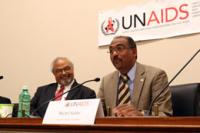 Ambassador Eric Goosby, U.S. Global AIDS Coordinator and UNAIDS Executive Director Michel Sidibé during the UNAIDS Forum on HIV, Human Rights and Men Who Have Sex with Men. Washington, September 16, 2009.
Ambassador Eric Goosby, U.S. Global AIDS Coordinator and UNAIDS Executive Director Michel Sidibé during the UNAIDS Forum on HIV, Human Rights and Men Who Have Sex with Men. Washington, September 16, 2009. Photo credit: UNAIDS/Jati Lindsay
According to UNAIDS, unprotected sex between men accounts for between 5% and 10% of global HIV infections, although the proportion of cases attributed to this mode of transmission varies considerably among countries. It is the predominant mode of HIV transmission in much of the developed world.
Evidence-based research demonstrates that providing HIV services to men who have sex with men helps to reduce the rate of HIV infection among this at-risk group. In many communities taboo and stigma towards men who have sex with men forces them to conceal their sexual practices which in turn may put their female partners at risk of HIV infection. Additionally, criminalizing men who have sex with men excludes them, or encourages them to exclude themselves, from accessing HIV related services out of fear.
In the coming months, UNAIDS and its partners will host a series of events on three high risk, marginalized populations: men who have sex with men, people who inject drugs, and sex workers. These meetings will build understanding of the importance of addressing the human rights needs of marginalized populations within the global AIDS response. The events will address policy and programmatic issues to increase awareness among AIDS policy and advocacy organizations to better address the needs of marginalized populations. The MSM event was the first of this series. UNAIDS will host the next Policy Forum on Sex Workers on 15 October 2009.
UNAIDS Forum on HIV, Human Rights and Men Who Hav
Press centre:
Feature stories:
Michel Sidibé presents UNAIDS’ vision in Washington, D.C. (14 September 2009)
External links:
Center for Strategic and International Studies (CSIS)
U.S. President’s Emergency Plan for AIDS Relief (PEPFAR)
Publications:
UNAIDS Outcome Framework: Universal Access for Men who have Sex with Men (pdf, 324 Kb)
Joint action for results: UNAIDS outcome framework, 2009 – 2011 (pdf, 396 Kb.)
Sexual Minorities - UNAIDS Guidance for Applicants to the Global fund to Fight AIDS, TB and Malaria Round 8 Call for proposals (pdf, 127 Kb.)
Related

Feature Story
New UN Plus groups in South Africa and Lesotho
16 September 2009
16 September 2009 16 September 2009
Lawrence Makeleni, UN+ plus member in south Africa speaking at the UN+ launch in Pretoria.
Credit: UNAIDS/G.Williams
UN Plus, the advocacy group of United Nations staff members living with HIV, is launching three country groups in Southern Africa – Pretoria, Johannesburg and Lesotho - after an increase in membership of UN Plus in the region. UN Plus members are undertaking a road trip across southern Africa where they will later launch the ‘Friends of UN Plus’ initiative in Swaziland and Mozambique.
UN Plus was established in March 2005 and has full support from the UN Secretary–General Mr Ban Ki-Moon who has met with the group on several occasions. UN Plus brings together HIV positive staff working in the UN system from across regions and agencies. Its membership in the southern African region has doubled in the last year; this region now accounts for 42% of its 158 members. The road trip, which began on 14 September and culminates in Johannesburg on 25 September, celebrates this achievement. It includes visits to South Africa, Swaziland, Lesotho and Mozambique.
There is a strong need to provide hope and mobilise support to UN staff who are living with HIV and not open about their status.
Lawrence Makeleni, UN Plus member from South Africa.
Participating in the road trip are UN Plus Coordinator Bhatupe Mhango and UN Plus co-founder Manuel da Quinta. They are accompanied by Dan Maina, the UN Cares Regional Coordinator for Eastern and Southern Africa; Simphiwe Mabhele of the UN SA Wellness programme (International Labour Organizatin) and Lawrence Makeleni, a UN Plus member from South Africa.
Although membership has increased, UN Plus has observed that many UN staff are not open about their HIV status due to high stigma levels, among other factors, associated with HIV. The group, therefore, plans to launch a ‘Friends of UN Plus’ initiative in Swaziland and Mozambique this month as a forum through which the needs of UN staff members living with HIV and those caring for HIV-positive friends and family can be articulated and addressed.

UNICEF representative in South Africa during the launch of UN+ in Pretoria
Credit: UNAIDS/G.Williams
Lawrence Makeleni welcomed the initiative, saying, “There is a strong need to provide hope and mobilise support to UN staff who are living with HIV and not open about their status. Being the only staff living openly with HIV [in South Africa] I believe that advocacy and working together in an efficient and organised way will provide others the ability to be more open about HIV.”
The South Africa and Lesotho chapters of UN Plus follow similar launches in Malawi and Kenya. In 2007, its members had agreed to start UN Plus groups at country level if at least two or more members were active and at least one had openly disclosed their HIV status, although UN Plus does not force its members to declare their status outside the group. In accordance with this principle, there are at least three active members of UN Plus in South Africa and Lesotho.
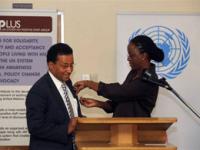
Dr. Catherine Sozi, UCC south Africa pins the UN plus badge on the lapel of UNODC Representative in South Africa and Resident coordinator a.i. Mr. Jonhatan Lucas marking the official launch of UN+ in South Africa.
Credit: UNAIDS/G.Williams
With this launch, UN Plus aims to initiate dialogue on the rights of people living with HIV and highlight the work of the UN in providing such a platform. It also expects to get a more formal recognition of its activities and membership and ensure that UN staff members in the region are more sensitised and committed to providing an enabling environment with zero tolerance for stigma and discrimination against people living with HIV. UN Plus currently represents 28 agencies and 41 countries. The group offers an opportunity for members to share their experiences of positive living and survival skills, treatment, care and support, stigma and discrimination and other issues regarding HIV. It also monitors how well their specific work environments respond to the UN Personnel Policy on HIV and AIDS.
There are an estimated 5.7 million people living with HIV in South Africa. In Lesotho that number is close to 270,000, or 23.2% of its population.
New UN Plus groups in South Africa and Lesotho
Partners:
Feature stories:
UN Secretary-General meets HIV positive UN staff members (20 May 2009)
UN Secretary-General opens UNPlus exhibition (01 December 2007)
UN Plus meets UN Secretary-General at UN Headquarters in New York: photo gallery (20 May 2009)
External links:
Unplus on Facebook
Unplus on Twitter
Publications:
UNplus Position Papers on Stigma and Discrimination; Travel and Mobility; Confidentiality; Health Insurance March 2007 (pdf, 713Kb)
UNplus flyer (pdf, 425K)
Related
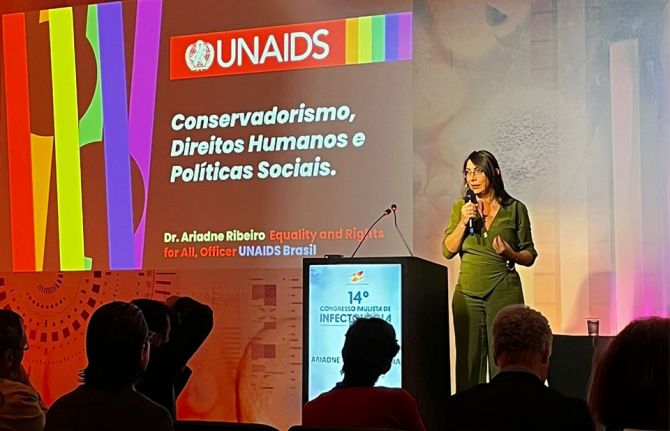 Upholding dignity for everyone: Ariadne Ribeiro Ferreira
Upholding dignity for everyone: Ariadne Ribeiro Ferreira

21 November 2024
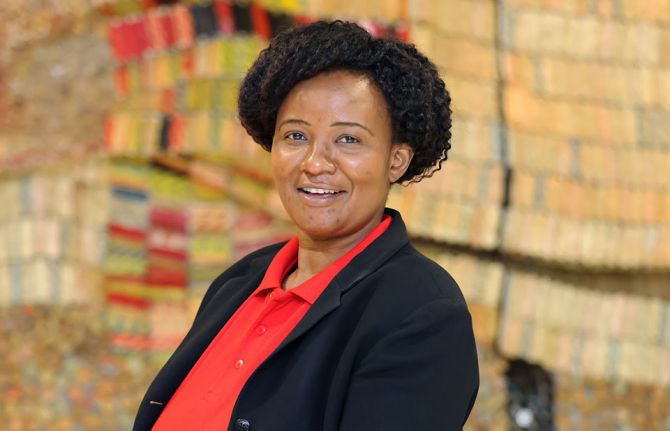 Evelyn Siula: A journey of strength and solidarity
Evelyn Siula: A journey of strength and solidarity
18 November 2024

Feature Story
Advocating for HIV and Hepatitis C co-infection services for injecting drug users in India
15 September 2009
15 September 2009 15 September 2009A version of this story was first published at www.unodc.org

AIDS activist Loon Gangte raises awareness of HIV and Hepatitis C co-infection
Loon Gangte is President of the Delhi Network of Positive People (DNP+) and a strong advocate of HIV and Hepatitis C (HCV) prevention. In an interview with the Regional South Asia office of the United Nations Office on Drugs and Crime (UNODC), he explains why HIV and HCV co-infection, especially among injecting drug users, is an issue needing urgent intervention. He begins with his views on stigma and discrimination.
UNODC: Injecting drug users (IDUs) living with HIV face stigma and discrimination. Why do you think it is important to be open about one's status, as you are?
LG: HIV-positive injecting drug users face a double stigma. They are marginalized and discriminated against on the basis of their drug use as well as their HIV status. In many cases it therefore becomes very difficult for HIV-positive IDUs to be comfortable with themselves. I had been leading a life with drug use for 15 years when I discovered my HIV status in 1998. I could not gather the courage to inform my family for four years because I was concerned about how they would react.
It is like wearing a tight shoe that hurts constantly but no one is aware of your painful situation.
Loon Gangte, President of the Delhi Network of Positive People
It was difficult to break the news but with the help of the young pastor at the church in Churachandpur, I was able to do so. They were shocked but not surprised.
I think it is very important to be open about one's status because it allows you to seek the right kind of medical treatment at the earliest opportunity. Secondly, it encourages others to be open about their own status and seek help. If you don't disclose your status, eventually the one who suffers is you. It is like wearing a tight shoe that hurts constantly but no one is aware of your painful situation. Imagine today if people are not open about their status, there would be no prevention and treatment programmes.
UNODC: Have you personally faced any stigma and discrimination? What is the DNP+ doing to address this problem?
LG: The people I’ve lived and worked with in New Delhi for the past 12 years have been supportive despite knowing my status. However, a couple of years ago, I was patiently standing in a long queue to collect HIV medication in a hospital in New Delhi. It was more than an hour before I finally inched my way to the tiny window and pushed the prescription paper through. During those days, if you were living with HIV, it was stamped prominently 'HIV- Positive', much like a bold seal. Seeing this, the nurse ordered me to the end of the queue again. While I stood back in line, I couldn’t work out why I was being discriminated against. Much later I realized that my HIV-positive status compelled her to single me out and treat me differently. I did not understand this right away since for me being HIV-positive did not mean that my rights have to be taken away. I am like any other person; if you cut my skin it will bleed, I have aspirations, the organs in my body function very much like any other man's. The presence of a tiny virus cannot make anyone take away my fundamental rights.
Because Hepatitis C and HIV have similar routes of transmission (particularly through needle sharing), co-infection is common among injecting drug users.
Loon Gangte, President of the Delhi Network of Positive People
The Delhi Network of Positive People has been working on treatment advocacy and towards reducing the stigma and discrimination faced by people living with HIV. Whenever any instance of discrimination is faced by members, DNP+, with help from the Lawyers Collective, intervenes and addresses the issue immediately, whether it is at the workplace, hospital, school or in the family. As part of their work they have Positive Speakers who highlight incidents of stigma and discrimination at various conferences as well as in workshops, school meetings, trainings and discussions. This helps bring attention to the issues faced by HIV-positive people. To address self stigma, DNP+ has started a self help group to provide those living with HIV with safe spaces to meet, interact and share experiences. Over a period of time members of the support groups become active members of DNP+ and champion the rights of those who are HIV-positive.
UNODC: You are also living with Hepatitis C infection. Describe your experiences in accessing treatment for HCV.
LG: Having both HIV and Hepatitis C is referred to as co-infection. I was diagnosed with this co- infection two years ago. I have been lucky that I have got funding through the International Treatment Preparedness Coalition for periodic Hep C testing. I am not on treatment currently. Hep C infection spreads rapidly among injecting drug users due to its high infectivity (about 10 times higher than HIV, and—unlike HIV—it can be transmitted by sharing not only needles and syringes, but also other injecting equipment such as water, cotton, etc). Because HCV and HIV have similar routes of transmission (particularly through needle sharing), co-infection is common among injecting drug users. Co-infection causes further complications, accelerates HCV progression and makes HIV treatment more difficult.
At the same time, HCV often presents no symptoms, and the vast majority of IDUs are not aware of their status as this group is not being reached by services and remains outside of the health care system. Thus, for universal access to be fully realized, treatment for HIV and HCV co–infection must be provided.
UNODC: Why is advocating for HCV treatment in India so important?
LG: One study estimates that 92% of injecting drug users is infected with Hepatitis C in India . Rates of HCV and HIV co-infection are high, especially in the north east of the country. The state of Manipur is worst affected . Currently there is no official, national or state-wide surveillance for Hep C in India. I have personally noticed that many of those infected with HIV are also infected with HCV. Despite considerable prevalence, HCV diagnosis, treatment and care are largely inaccessible here.
The biggest challenge is to raise awareness about HCV and HIV co-infection among drug users and health professionals. The test for Hep C is costly and ranges from US $1200 - US $2100 in India. Testing for HCV can be included as part of the anonymous testing for HIV being provided through Integrated Counselling and Testing Centres.
The medications used in HCV treatment, pegylated interferon and ribaviron, are expensive. A six month course costs between US$ 4 000—5 000; the lifetime income of some Indians. Unlike HIV, where first line Antiretroviral Therapy (ART) is provided free, there is no government support or subsidy for HCV treatment. Ironically, in Manipur where HCV and HIV co-infection is high, patients are dying of liver complications, despite treatment with and adherence to ART.
The WHO, UNAIDS and UNODC target setting guidelines for countries now include treatment for Hepatitis B and C as part of the comprehensive package of services for drug users. As always, prevention is key in arresting transmission. The national and public health systems need to be supported to prevent blood-borne transmission and provide HCV treatment, regardless of cost and if possible free of cost: many infected with Hepatitis C cannot afford the cost of testing and treatment. Prices of drugs for HCV have to be drastically reduced.
UNODC works in India on HIV prevention, care and treatment for injecting drug users and prison population. UNODC works with Government counterparts, non governmental organizations, networks of people who use drugs, and people living with HIV and advocates for delivering comprehensive packages of services.
1 Aceijas C.Rhodes T Global estimates of HCV among Injecting Drug Users. Int Journal of Drug Policy 2007,18(5),352-358
2 Sarkar K, Bal B, Mukherjee R, Chakarabortys, Bhattacharya SK, Epidemic of HIV coupled with HCV Injecting drug users in west Bengal, Eastern India bordering Nepal, Bhutan and Bangladesh, Substance Use Misuse 2006, 41(3);341-52
Advocating for HIV and Hepatitis C co-infection s
Cosponsors:
Feature stories:
Injecting drug users take central role in anti-stigma film (10 August 2009)
International Harm Reduction conference opens in Bangkok (20 April 2009)
OPINION: HIV and drugs: two epidemics - one combined strategy (20 April 2009)
UNODC and Iran sign agreements to reduce vulnerability of women and Afghan refugees to drugs and HIV (24 March 2009)
Injecting drug use and HIV: Interview with UNAIDS Team Leader, Prevention, Care and Support team (11 march 2009)
OPINION: Silence on harm reduction not an option (11 March 2009)
Publications:

Feature Story
Michel Sidibé presents UNAIDS’ vision in Washington, D.C.
14 September 2009
14 September 2009 14 September 2009The Center for Strategic and International Studies (CSIS) Global Health Policy Center invited the UNAIDS Executive Director Michel Sidibé to share his vision for the future direction of UNAIDS, including prospects for accelerated global action in support of universal access to HIV services.
In his first public address in Washington D.C. since assuming his position as head of UNAIDS, Mr Sidibé recognized the efforts made by the United States in responding to AIDS, from the gay rights movement of the early days of the epidemic to the PEPFAR programme and the leadership of the Obama administration, and in particular the new comprehensive global health strategy. However, he stressed that “Despite these heroic efforts, HIV continues to outstrip our response.”
The AIDS plus MDG agenda provides an opportunity to unite the creativity, determination and momentum of the AIDS movement with movements for other MDGs.
UNAIDS Executive Director, Michel Sidibé
“Change is possible,” he stated “but only if we are ready to address the underlying drivers of the epidemic.” Mr Sidibé emphasized the need to take the AIDS response out of isolation and link it to the Millennium Development Goals (MDG). “The AIDS plus MDG agenda provides an opportunity to unite the creativity, determination and momentum of the AIDS movement with movements for other MDGs,” he said. “Surely this will accelerate progress on AIDS as well as other MDG targets—reaping bidirectional benefits and multiplier effects,” he added.
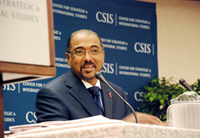
UNAIDS Executive Director Michel Sidibé addressed CSIS, 14 September 2009. Credit: CSIS/Daniel J. Porter
During his presentation, Mr Sidibé took the opportunity to outline UNAIDS strategy for the AIDS response. Mr Sidibé underscored that the “value proposition” of UNAIDS—advocating, brokering and convening—is now more urgent than it has ever been.
As part of his official visit to the country’s capital, Mr Sidibé will meet with representatives of the United States Senate, Congress and Administration as well as with the country’s Global AIDS Ambassador Mr Eric Goosby.
Later in the week, Mr Sidibé will participate in the Forum on HIV, Human Rights and Men Who Have Sex with Men. This event will raise attention to the human rights issues that affect men who have sex with men (MSM) and other sexual minorities. It will also look at the policy and structural barriers that prevent MSM and other sexual minorities from accessing HIV services, including prevention, treatment, care and support.
Michel Sidibé presents UNAIDS’ vision in Washingt
Press centre:
Read UNAIDS Executive Director’s speech: AIDS as Health, Dignity and Security: A New Paradigm for the Future of the Global Response
UNAIDS congratulates Dr Eric Goosby on his confirmation as next US Global AIDS Coordinator
Feature stories:
Coalition of global business gathers to turn knowledge into action on AIDS (23 June 2009)
US AIDS relief programme exceeds goals for HIV treatment and care (13 January 2009)
External links:
Center for Strategic and International Studies (CSIS)
U.S. President’s Emergency Plan for AIDS Relief (PEPFAR)
Multimedia:
Listen to UNAIDS Executive Director presentation at the CSIS event (mp3)
Publications:
Joint action for results: UNAIDS outcome framework, 2009 – 2011(pdf, 396 Kb.).
Related

Feature Story
Resources for regular lab tests could be used for HIV treatment
11 September 2009
11 September 2009 11 September 2009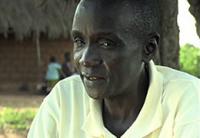
Vincent was one of the 3,316 DART participants and is also one of the main characters of The DART Story, a newly launched documentary film. Credit: Medical Research Council
Having 12 children and a very old mother to support, Vincent, middle-aged Ugandan single father living with HIV, knows that his death would spell disaster for the whole family. “If I had died, where would these people go?” said VincentN perched on a stool with his legs outstretched
Fortunately, Vincent has survived. He said it is DART that has saved his life. DART, the Development of Antiretroviral therapy in Africa, is the largest HIV treatment trial ever carried out on the world’s second most-populous continent.
The DART trial has recently reached a remarkable finding in HIV treatment: that taking HIV treatment does not have to be accompanied by regular laboratory tests, at least for the first two years.
James Hakim, professor of the University of Zimbabwe Medical School and co-principal investigator of DART, said the health economists in the DART team who have analyzed the trial data have concluded that a third more people could be successfully treated for HIV in Africa if expensive lab tests weren’t used routinely. “The challenge now is for policy-makers to widen availability of ART,” said the professor.
Before, it was believed that a person on HIV treatment should have regular tests, including CD 4 cell counts, a measure of how well the body’s immune system, which is damaged by HIV, is working.
The DART results show that 87% of people receiving HIV treatment without routine blood test monitoring were still alive and well after five years, only 3 percentage points less than in the group that had routine blood test monitoring. This finding suggests that many more people living with HIV in Africa could receive treatment for the same amount of money that is currently spent on routine lab tests used to monitor the effects of antiretroviral therapy.
It could also lead to antiretroviral therapy being delivered safely and effectively by trained and supervised health workers in remote communities where routine laboratory tests are not available due to high costs or poor resources.
Professor Peter Mugyenyi of the Joint Clinical Research Centre in Uganda, also a DART co-principal investigator, agreed that governments now have evidence that expensive blood tests aren’t needed routinely for HIV treatment to be successful and safe. “It also means that treatment could be delivered locally as long as health care workers have the right training, support and supervision,” said Peter, “This could make a huge difference to people who live in remote areas that are many days walk from the nearest hospital or laboratory.”
According to UNAIDS estimates HIV treatment only reached a third of the 9.7 million people in need at the end of 2007. In Africa alone, around 4 million people urgently need antiretroviral therapy but the resources are limited.
The DART Story
Aiming at finding a safe, simple and more economical way of carrying out HIV treatment, the DART trial began six years ago when treatment for people living with HIV was just starting to become more widely available in Uganda and Zimbabwe.
Vincent was one of the 3,316 DART participants that had severe or advanced HIV infection while not having previously had any antiretroviral therapy. He is also one of the main characters of The DART Story, a newly launched documentary film narrated by Annie Katuregye. The narrator herself, whose husband died of AIDS-related illnesses seventeen years ago at the age of 34, joined the DART trial in Uganda in 2003.
 Annie Katuregye joined the DART trial in Uganda in 2003 and is the narrator of the film The DART Story. Credit: Medical Research Council
Annie Katuregye joined the DART trial in Uganda in 2003 and is the narrator of the film The DART Story. Credit: Medical Research CouncilLike all the other DART participants, Annie and Vincent
randomly allocated to one of two groups. People in the first group received antiretroviral therapy and their doctor was given the results of blood tests done every three months to check for drug side-effects and measure their CD4 cell count. People in the second group had the same antiretroviral treatment and the same blood tests done, but their doctors did not see CD4 count results and only saw the results of safety tests if they were seriously abnormal. People in both groups received free medical care and free diagnostic tests for episodes of illness throughout the trial.
Besides the only 3-percentage-point difference in survival, 78% of the people who survived in the first group had developed no new AIDS-related illnesses, compared with 72% in the second group. No difference in the occurrence of side effects caused by antiretroviral treatment was found between the two groups.
Moreover, irrespective of group, the survival rate in the DART trial is amongst the best reported from any trial, antiretroviral therapy programme or study in Africa. Historical comparisons, based on data from follow-up of similar patients in Uganda who did not have access to antiretroviral treatment make it clear that few of the DART participants would have been alive after five years without treatment.
Sponsored and funded by the UK Medical Research Council, the DART trial was collaboratively carried out by scientists and health care workers from Africa and the United Kingdom. With an original purpose of finding out whether the lab-based strategies used to deliver antiretroviral therapy to people with HIV infection in resource rich countries were essential in Africa, DART has hit its target.
Resources for regular lab tests could be used for
Multimedia:
View video DART Anti-retroviral Trial
Feature stories:
HIV Treatment data update – July 2009 (23 July 2009)
Making HIV trials "work for women" (12 September 2007)
External links:
DART trial participants tell their stories (21 July 2009)
DART trial finds HIV therapy could be given safely without routine laboratory tests to save more lives in Africa (21 July 2009)
Publications:
Good participatory practice guidelines for biomedical HIV prevention trials (pdf, 733 kb.)
Antiretroviral therapy for HIV infection in adults and adolescents: Recommendations for a public health approach (pdf, 1.082 kb.)
Creating Effective Partnerships for HIV Prevention Trials (pdf, 182 kb.)
Ethical considerations in biomedical HIV prevention trials (pdf, 722 kb.)
Handbook on access to HIV/AIDS-related treatment (pdf, 2 Mb.)
Related

Feature Story
Male circumcision programmes as part of combination HIV prevention are beneficial and cost effective
08 September 2009
08 September 2009 08 September 2009
Male circumcision among heterosexual men in high HIV prevalence and low male circumcision settings is beneficial and cost effective, says a new article in the open access journal PLoS Medicine.
The report is based upon the findings of a series of meetings, convened by UNAIDS, the World Health Organization (WHO), and the South African Centre for Epidemiological Modelling and Analysis (SACEMA). These meetings reviewed published and unpublished modelling work to estimate the long-term population impact and cost-effectiveness of male circumcision programmes through mathematical modelling approaches.
Six models were considered by the expert group, which was led by Dr. Catherine Hankins, Chief Scientific Advisor at UNAIDS. The models predicted that, using a 10 year time horizon, one new HIV infection would be averted for every five to 15 men newly circumcised. For the most successful interventions, where almost all men are circumcised, HIV incidence could be reduced by 30% to 50% over the same period, with prevalence trends also following this decrease.
The estimated costs per adult male circumcision are between $30 and $60, depending on the programme setting, with neonatal circumcision costing about one-third this amount. The models estimate costs per infection averted of between $150 and $900 in high HIV prevalence settings over a 10-year time horizon.
All the models indirectly confirmed that the most favourable cost-effectiveness ratios will be seen where HIV incidence is highest. By comparison, estimates of discounted lifetime treatment costs typically exceed $7,000 per HIV infection if only first-line treatment is provided, and twice as much if second-line treatment is available. Thus, circumcising sexually active males of any age is likely to be cost saving.
While several studies have confirmed that male circumcision performed by well-trained medical professionals reduces the risk of men acquiring HIV through female-to-male transmission by approximately 60%, a major concern raised in discussions around male circumcision, is that it does not directly protect women from HIV. However, women do benefit indirectly from reduced HIV prevalence in circumcised male sexual partners as male circumcision programmes scale up.
Male circumcision does not replace other prevention measures. Because it provides partial protection, it should be combined with strategies such as delaying the onset of sexual relations, abstaining from penetrative sex, reducing the number of sexual partners, using male and female condoms correctly and consistently, learning your HIV status, and getting treatment for sexually transmitted disease.
Male circumcision may have minimal impact on reducing HIV transmission among men who have sex with men.
Male circumcision programmes as part of combinati
Cosponsors:
Feature stories:
New clearinghouse on male circumcision for HIV prevention launched (23 February 2009)
Male circumcision: context, criteria and culture (part 1) (26 February 2007)
Male circumcision and HIV: the here and now (part 2) (28 February 2007)
Moving towards: UN policy and action on male circumcision (part 3) (02 March 2007)
International experts review male circumcision (part 4) (07 March 2007)
Multimedia:
External links:
PLoS.org
PLoSmedicine.org
Male Circumcision for HIV Prevention in High HIV Prevalence Settings: What Can Mathematical Modelling Contribute to Informed Decision Making?
Tools:
Clearinghouse on Male Circumcision for HIV Prevention
Publications:
Male Circumcision for HIV Prevention in High HIV Prevalence Settings: What Can Mathematical Modelling Contribute to Informed Decision Making? (pdf, 160 Kb)
Communications guidance - Male circumcision & HIV prevention in eastern and southern Africa (pdf, 150 Kb)
Safe, voluntary, informed male circumcision and comprehensive HIV prevention programming - Guidance for decision-makers on human rights, ethical & legal considerations (pdf, 382 Kb)
Recommendations from WHO/UNAIDS meeting on male circumcision and HIV prevention, Montreux, 28 March 2007 ( en | fr ) (pdf, 127 Kb | 148 Kb)

Feature Story
Moldova: NGOs coming together to strengthen HIV response
07 September 2009
07 September 2009 07 September 2009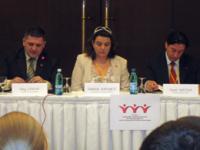
To promote a bigger role of NGOs in the HIV response in Moldova, the League of People Living with HIV of Moldova in collaboration with UNAIDS, hosted a two-day national NGO forum in Chisinau. Credit: UNAIDS
Speaking with many voices and representing many different perspectives, the non-governmental organizations (NGOs) play a key role in the response to the AIDS epidemic in countries around the world. As key partners in the development of national AIDS responses, NGOs are well positioned to provide quantative and qualitative information to augment the data collected by governments.
To promote a bigger role of NGOs in the HIV response in Moldova, the League of People Living with HIV of Moldova in collaboration with UNAIDS, hosted a two-day national NGO forum in Chisinau in the middle of June.
Bringing together more than 120 representatives from the civil society, government and international organizations, the Third Forum of Nongovernmental Organizations of Moldova active in area of HIV and TB included 26 NGOs representing all regions of Moldova. Presenting results achieved in the past year while exchanging opinions and experiences, participants agreed that joint efforts are essential for an effective response to AIDS.
Oleg Lozan, Vice Minister of Health, said at the opening ceremony that Moldova has made progress in the AIDS response thanks to the joint efforts made by government and non-governmental organizations. “The civil society’s contribution is huge,” said Lozan, “NGOs have largely covered areas insufficiently reached by the state in the AIDS response.”
Civil society participation in responding to the epidemic has been institutionalized in Moldova through the establishment of several coordination mechanisms such as the Harm Reduction Network, the network of NGOs working in the field of HIV, and the National League of People Living with HIV.
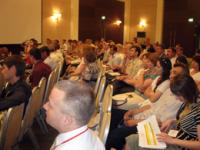
Presenting results achieved in the past year while exchanging opinions and experiences, participants agreed that joint efforts are essential for an effective response to AIDS. Credit: UNAIDS
The government of Moldova supports the involvement of NGOs in scaling up the country’s response to HIV. NGOs are active members of the National Coordination Council TB/AIDS and its associated technical working groups and they have fully participated in the formulation of the new 2007 Law on Prevention of HIV/AIDS.
“Civil society involvement has been consolidated in the country and they have contributed to the progress made in different priority areas of the national AIDS response such as HIV prevention, adherence to ARV treatment, harm reduction, and support and care for people infected with and affected by HIV,” said Gabriela Ionascu, UNAIDS Country Coordinator.
HIV in Moldova
Moldova is classified as a country with low prevalence of HIV. According to UNAIDS 2008 Report on the Global AIDS Epidemic, an estimated 8,900 people are living with HIV in the Republic of Moldova, with 29% being women.
The main mode of transmission is the use of contaminated equipment by injecting drug users. However there are signs of HIV spreading into the general population as unprotected sex is an increasing mode of transmission in the country.
According to a national report issued by National Centre on Health Management in 2008, the proportion of Moldova women among newly reported HIV cases with sexual route of transmission is also growing (62% in 2007, compared to 57% in 2006).
Related

Feature Story
Rwanda leading the way in jointly tackling TB and HIV
02 September 2009
02 September 2009 02 September 2009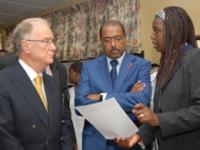
(L to R): Dr Jorge Sampaio, UN Secretary General’s Special Envoy to Stop TB, UNAIDS Executive Director Michel Sidibé and Dr Anita, Asiimwe, Executive Secretary of the National AIDS Control Comission during a visit to the Centre Medical Social de Kiryogo near Kigali, Rwanda on 1 September 2009. Credit: UNAIDS/L.Rusanganwa
Dr Jorge Sampaio, the UN Secretary General’s Special Envoy to Stop TB and UNAIDS Executive Director Michel Sidibé together witnessed, first-hand, delivery of integrated HIV and TB services during a visit to the Socio-Medical Centre in Biryogo.
"It is gratifying to be at this clinic, which has intensified TB case finding in people living with HIV through TB screening and transferring confirmed cases to a TB clinic. In addition patients who enrol at the health centre with tuberculosis are also tested for HIV and those found to be HIV positive are given integrated care and support. It is a programme that reflects Rwanda's impressive progress nationwide on coordinating TB and HIV services," said Dr Jorge Sampaio, the UN Secretary-General's Special Envoy to Stop TB.
Mr Sidibé highlighted the progress Rwanda has made in improving the outcome of TB and HIV co-infection through better collaboration and the use of innovative diagnostic technology and underlined the UN’s commitment to effectively tackling the dual epidemics.
I am pleased to see that Rwanda is leading Africa and the world in taking an integrated approach to dealing with the interlinked epidemics of TB and HIV. Rwanda’s bold leadership is achieving impressive results that show the rest of Africa what can be achieved.
UNAIDS Executive Director Michel Sidibé
“I am pleased to see that Rwanda is leading Africa and the world in taking an integrated approach to dealing with the interlinked epidemics of TB and HIV. Rwanda’s bold leadership is achieving impressive results that show the rest of Africa what can be achieved," said Mr Sidibé said.
Mr Sidibé emphasize that tackling TB and HIV jointly is a priority for UNAIDS and, as stated in the UNAIDS Outcome Framework 2009-2011, it is one of the nine key areas for achieving results with the final goal being that no person living with HIV should die of TB.
Dr Sampaio and Mr Sidibé proceeded to another joint visit to Rwanda's National Reference Laboratory in Kigali, where they saw evidence of the country's major investment in laboratory services.

(L to R): UN Resident Coordinator, Aurélien Agbénonci, Dr Jorge Sampaio, United Nations Secretary General Special Envoy for Tuberculosis and UNAIDS Executive Director, Michel Sidibé visiting the Centre Medical Social de Kiryogo near Kigali, Rwanda on 1 September 2009. Credit: UNAIDS/L.Rusanganwa
Rwanda has been tackling a thorny issue -- the difficulty of diagnosing TB among people living with HIV. TB diagnosis requires visualization under a microscope of the bacteria that cause the disease, obtained via sputum samples. Among people living with HIV, often few bacteria are present in the sputum and they are therefore not detectable through conventional diagnosis, even if the person has serious TB disease. Consequently the diagnosis is often missed.
The sensitivity of a TB diagnosis can be improved by incubating the samples to multiply the TB bacteria; but this process can take weeks or even months using conventional methods. To increase speed and accuracy of TB diagnosis, fast liquid culture (MGIT) will be introduced and rolled out soon in Rwanda. The National Reference Laboratory is also studying more efficient microscopes and staining techniques to improve speed of TB diagnosis.
Since 2004 Rwanda has had the capacity to test for drug-resistant TB. The National Reference Laboratory and the other main laboratories in the country are also currently developing their capacity to diagnose cases of XDR-TB (although none have been detected in Rwanda to date).
Dr Sampaio and Mr Sidibé congratulated the laboratory staff on their excellent work and recognized the key role they play in reducing deaths from TB among people living with HIV.
They highlighted the need for much greater investment in strengthening laboratory services and committed to advocating for increased investment in research for a faster, simpler and more accurate TB test.
Rwanda leading the way in jointly tackling TB and
Cosponsors:
World Health Organization (WHO)
Partners:
Speeches:
Multimedia:
Feature stories:
UNAIDS Executive Director official visit to Rwanda continues (01 September 2009)
Publications:
Joint action for results: UNAIDS outcome framework, 2009 – 2011 (pdf, 396 Kb.)
Related

Feature Story
UNAIDS Executive Director official visit to Rwanda continues
01 September 2009
01 September 2009 01 September 2009
President of Rwanda, H.E. Paul Kagame (right) met with UNAIDS Executive Director, Michel Sidibé. Rwanda, 1 September 2009. Credit: UNAIDS/L.Rusanganwa
UNAIDS Executive Director Michel Sidibé has met with President of Rwanda, H.E. Paul Kagame, and the First Lady of Rwanda, H.E. Jeanette Kagame, as well as representatives of civil society organizations.
Yesterday he addressed the 59th session of the World Health Organization’s (WHO) Regional Committee for Africa in Kigali. Mr Sidibé stressed the urgent need stop new HIV infections and called for a sea-change approach to prevent sexual transmission of HIV. “Prevention must become our watchword, the banner we raise in this critical stage of the response,” said Mr Sidibé.
Mr Sidibé also congratulated Dr Luís Sambo on his re-election as the WHO Regional Director for Africa and reiterated the full support of UNAIDS to him and WHO. The two organizations collaborate closely on several fronts including the Harmonization for Health in Africa initiative. Mr Sidibé spoke about the importance of the goal of primary health care: “These and other such efforts will enable us to do more with less—and do it more sustainably,” he said.
UNAIDS Executive Director official visit to Rwand
Cosponsors:
World Health Organization (WHO)
Speeches:
Multimedia:
Feature stories:
UNAIDS Executive Director’s first official visit to Rwanda (28 August 2009)
Made in Africa (02 July 2009)
Publications:
Joint action for results: UNAIDS outcome framework, 2009 – 2011 (pdf, 396 Kb.)
Related

Feature Story
UNAIDS Executive Director’s first official visit to Rwanda
28 August 2009
28 August 2009 28 August 2009
First Lady of Rwanda, H.E. Jeanette Kagame with UNAIDS Executive Director, Michel Sidibé. Rwanda, 28 August 2009. Credit: UNAIDS/L.Rusanganwa
UNAIDS Executive Director Michel Sidibé is paying his first official visit to Rwanda from 27 August to 3 September to recognize and support the achievements of the Government of Rwanda in the HIV response and conduct high-level advocacy for universal access to HIV services and the Millennium Development Goals.
Mr Sidibé will meet with the President of Rwanda, H.E. Paul Kagame, and the First Lady of Rwanda, H.E. Jeanette Kagame, to discuss the current global and regional opportunities and challenges in tackling HIV and how they will influence the long-term AIDS response in Rwanda and across Africa. Meetings are also scheduled with representatives from the private sector, civil society, including people living with HIV, and high-level representatives from the government and UN agencies. The meetings will provide an opportunity to address the United Nations’ support in Rwanda’s HIV response.
Mr Sidibé will visit several projects, including Rwamagana Hospital which offers prevention of mother-to-child HIV transmission (PMTCT) services and integrated health services. It is estimated that around 56% of HIV-positive pregnant women received antiretroviral therapy (ART) in Rwanda. By the end of the year, it is expected that the coverage will reach 70%. The target coverage for 2012 is 90%.
A visit is also planned to Biryogo’s health center where the UNAIDS Executive Director will witness first-hand the delivery of integrated HIV and TB services as well as nutritional support in health settings. He will also stopover at an association of former sex workers in Muhanga District, considered a model of community best practices in HIV prevention and AIDS impact mitigation.
UNAIDS Executive Director will provide the opening remarks at the fifty-ninth session of the WHO Regional Committee for Africa. Mr Sidibé will emphasize the need to transform Africa’s pharmaceutical sector by creating an African Medicines Agency in order to face emerging health threats as well as putting Africans in control of their development.
Progress towards Universal Access
With an HIV prevalence estimated to at around 2.8%, there are an estimated 150.000 people living with HIV in Rwanda, including around 19,000 children according to the 2008 UNAIDS Report on the global AIDS epidemic. Despite these figures, Rwanda appears to be on track to meet its current universal access targets.
Review of national reports in 2008 demonstrated that universal access has catalyzed an accelerated and strengthened national HIV response with more results-based planning and a general overall increase in access to HIV services. National political leadership and coordination were found to be critical in the scale up.
However more emphasis was needed on accelerating progress on HIV prevention efforts, and to better utilise the resources available within civil society and people living with HIV.
The increase of antiretroviral therapy (free and integrated into health services) is a major success for the country. ARV coverage was 63% at the end of 2008 and the target coverage for 2012 is expected to reach 91% of the people in need. Furthermore, there has been a significant increase in percentage of facilities offering ARV services from 7% in 2004 to 45% in 2008.
Rwanda has adopted an expanded the ABC (abstinence, be faithful, use a condom) approach to include education; so that it is known as EABC and numerous partners are involved in awareness work (about 500 000 people were reached by prevention messages in 2006). However, little data are available to convey a clear sense of the scope of HIV prevention programmes with regard to most-at-risk populations.
Therefore, an evidence-based prevention strategy has yet to be developed and fully implemented with focus on developing appropriate tailored interventions for the most-at-risk populations (prisoners, sex workers and men who have sex with men).
Joint UN Plan on HIV
In January 2007, Rwanda became one of the eight pilot countries for the One UN Reform initiative. UN agencies in Rwanda are now working towards ‘One Programme’, ‘One Leader’, ‘One Office’ and ‘One Budgetary Framework’. In order to ensure that its contributions support and reinforce the priorities of the national response to HIV in Rwanda, the UN system has developed a Joint UN Plan on HIV for the period 2008-2012.
The Joint Plan comprises three main focus areas for HIV: the “Three Ones” principles (lead agencies UNDP/UNAIDS); increased awareness and intensified prevention (lead agencies UNICEF/UNFPA); and scaling-up treatment, care and support (lead agency WHO). To ensure accountability, each of the lead agencies is responsible for their own achievements.
UNAIDS Executive Director’s first official visit
Feature stories:
UNICEF: Communities provide a bigger ‘family’ for orphaned children in Rwanda (09 Mar 2009)


